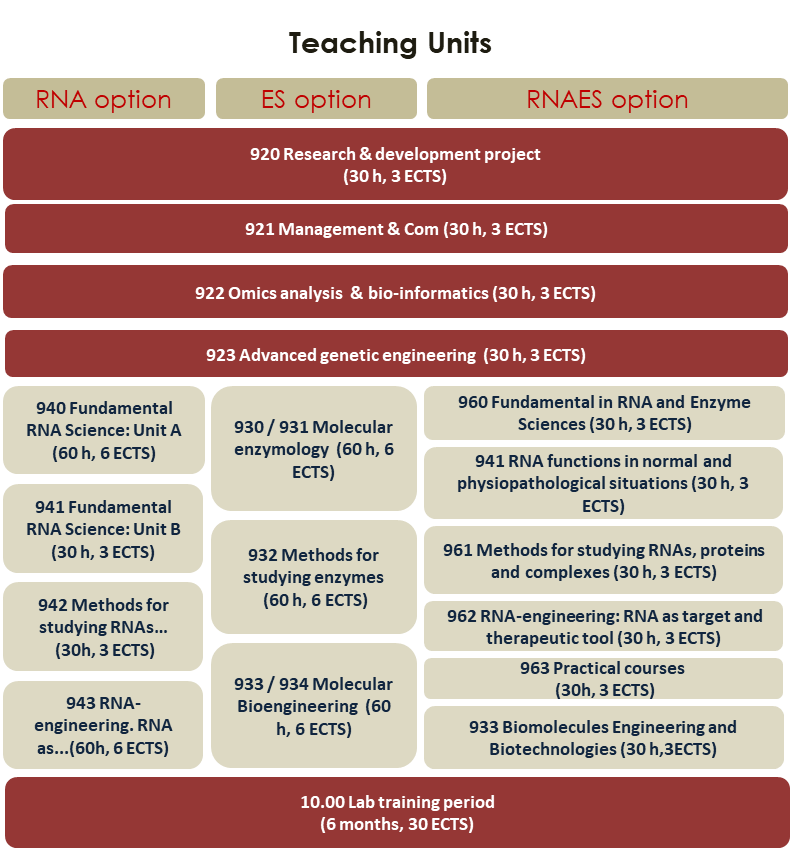DEGREES
Master in Life Sciences Specialization RNA and Enzyme Sciences
RNA and Enzyme Sciences (RNAES) is one out the five courses of the Master of Life Sciences. The 2nd Year of the Master RNAES is displayed in English and open to international students.
General information of the Master program
- The Master of Life Sciences tackles the current research in Molecular Biology, Cell Biology and Physiology. The program follows up the interactions between disciplines applied in the field of fundamental and engineering sciences biology, biophysics, biochemistry, synthetic biology, structure and function of macromolecules and molecular and cellular mechanisms involving them.
- The Master program is dedicated to provide a coherent overview of fundamental knowledge, scientific and technical, not only theoretical but also practical, and to develop methodological and organizational skills in the field of cell and molecular biology, biochemistry, enzymology, structural biology, biological engineering. It is also expected that each candidate applies its own-acquired skills to the analysis and resolution of problems in professional situations.
- The pedagogic staff is paying attention to the personal and professional project of each student. One of the educational objectives of the program is also to enable students to develop their capacity for autonomy, integration, organization and communication through group works and group projects, and by internships during the 2 years of the Master.
- The program is supported by recognized research teams, located in the Université de Lorraine (UL). The research teams are mainly involved in fundamental or applied research projects dedicated to Biological Sciences. Moreover, part of the researchers and teacher-researchers participate to the lectures, practical approaches or supervision of students during internships. Finally, the courses are completed by seminar and conferences by several external lecturers, who are professionals from public and private structures.
Organisation of the Master program
The Master of Life Sciences gives the opportunity to students to acquire specialized knowledge and skills during two years.
- The first year is displayed in French and is organized as follows:
- 1st semester: Courses in Biochemistry, Molecular Biology and Cell Regulation or courses in Cell Biology and Physiology
- 2nd semester: Students have the choice between several courses, based on their personal and professional project, e.g. courses in Cell Biology, Enzyme Sciences, RNA sciences and Heath Biology Research, Physiology or Biotechnology (two options, Molecular Engineering; Cell Engineering & Applied Neuro- and Physiology).
- The second year of master gives a final specialization schedule.
- The 3rd semester is dedicated to lectures and practical courses.
- The 4th semester involves a 6 months-internship in public or private research structures, in France or foreign countries.
- Biotechnology – option Cell Engineering (in French)
- Biotechnology – option Molecular Engineering (in French and part in English*)
- Biotechnology – option Applied Neuro- and Physiology (in French)
- Research in Heath Biology (in French and part in English*)
- RNA and Enzyme Sciences (in English)
(*, the lessons in english are those common with the RNAES course).
RNA and Enzyme Sciences (RNAES)
Presentation
Presentation
- Lorraine University in Nancy, France, offers an international teaching program in English in the field of RNA molecular biology and enzymology. The primary goal of this Master 2 program (second year of master) is to provide a unique opportunity to study these molecular aspects of cellular metabolism with experts in the field.
- The Master 2 program “RNA/Enzymes Sciences” RNAES is underpinned by high-standard scientific environment provided both by the BioPole of Lorraine University and by associated and partner labs in close proximity to Nancy.
- The BioPole building, constructed in 2011, hosts the IMoPA CNRS-UL research unit, which focuses its activity on fundamental and applied aspects of molecular enzymology, RNA biology and bioengineering. The research groups located in the BioPole benefit from the presence of state-of-the-art facilities covering all aspects of structural biology, proteomics, high-throughput DNA sequencing and imaging.
RNA and Enzyme Sciences (RNAES)
Objectives
Objectives
- The appliquant will acquire both theoretical and practical knowledge in biochemistry, molecular and cellular biology of RNAs and / or enzymology.
- By the end of the Master 2 Program, the students should be able to conduct a research or industrial project in an autonomous manner. Specifically, the students should be able to understand the scientific question(s), elaborate possible solutions, and conceive and execute an experimental protocol. They should also be able to interpret experimental data, and to present results in both oral and written form.
RNA and Enzyme Sciences (RNAES)
Course content
Course content
- The course will cover various topics in RNA biology and/or enzymology. The figure, below, details the different teaching units

Selection
- RNAES takes place during the second year of Master (third and fourth semesters of the Master (namely, S9 and S10 respectively). RNAES is opened to students granted after the 1rst year of a Master program in Biochemistry, Molecular Biology. Applications will be examined by the admission commission. An interview (telephone and / or face-to-face) is often proposed.
Location
- Sciences and Technolgy Faculty





